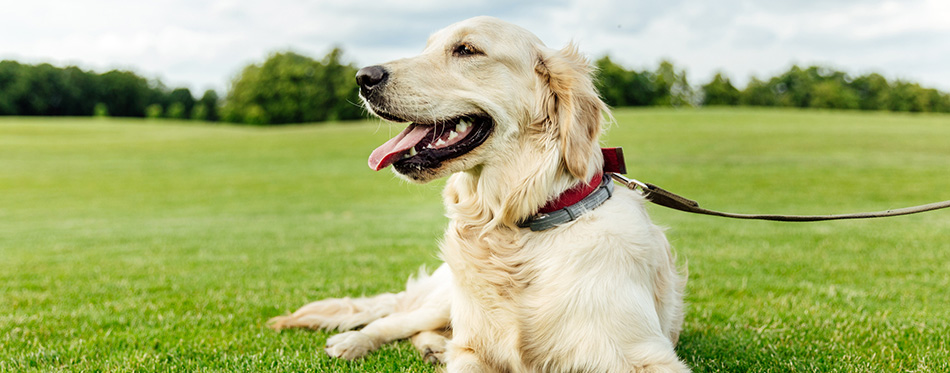Panting is about as typical as canine behavior gets. Because our four-legged friends have very few sweat glands, they rely on sticking out their tongues to cool themselves down. Most of the time, panting is perfectly normal, and nothing to worry about.
However, occasionally dogs exhibit what’s referred to as abnormal panting. If your dog is panting abnormally, it could be a sign that something’s wrong. That’s why we’ve put together this brief guide. Below, we run through how to tell the difference between normal and abnormal panting, why it happens, and how you should respond.
Why do Dogs Normally Pant?
With their heavy coats, dogs find it harder to keep cool than humans. Without sweat glands all over their bodies, it can be difficult for our pooches to let off excess heat. In fact, dogs only have sweat glands on their nose and paw pads. Luckily, evolution has come up with an ingenious solution – panting.
When dogs stick out their tongues and breathe heavily, their saliva evaporates, cooling the tongue and respiratory tract in the process. When this cool blood is circulated around your dog’s body, their overall temperature is lowered.

What does Normal Panting Look Like?
Normal panting occurs when your dog begins to overheat – it’s a healthy response to their environment. You can spot normal panting through the following signs:
- It’s an appropriate response to stimuli
Normal panting should be a response to heat – dogs should only pant when they have just exercised or it’s warm outside.
- Your dog’s breathing isn’t labored
When a dog pants normally, they may gulp in up to 400 breaths every minute! In a healthy dog, none of these should sound raspy or labored.
- It isn’t accompanied by unusual symptoms
If your dog is panting normally, their panting should not be accompanied by signs that they are unwell.
- They don’t pant for too long
If your dog continues to pant heavily after they have fully cooled down, this could be a sign that something isn’t quite right.
What does Abnormal Panting Look Like?
Because our dogs pant all the time, abnormal panting can be challenging to spot. Look out for the following signs:
- The panting is excessive compared to your dog’s typical pattern
- Your dog pants when they have not been exercising, and don’t seem to be too hot
- The panting sounds raspy, wheezy, louder than usual, or otherwise abnormal
- Your dog’s breath appears to be labored
- Your dog spends longer than they usually would panting
- Panting seems to be a lot of effort for your dog
What Can Cause Excessive Panting?
Excessive heavy panting can be an early warning signs for some canine health concerns. Below, we discuss the most common issues, along with other common symptoms to watch out for.
- Heatstroke
Just like us, dogs are mammals. This means that they need to maintain a consistent body temperature in order for everything to function as it should. For this reason, prolonged overheating can be very dangerous. When a dog’s body temperature reaches 109 degrees Fahrenheit or higher, they experience heat stroke. Along with excessive panting, heat stroke causes symptoms such as glazed eyes, bright red gums and tongue, and increased pulse. Heat stroke can be fatal, and should be treated immediately.
- Brachycephalic breed issues
Brachycephalic dog breeds, such as pugs, bulldogs, and Pekingese, are prone to breathing problems – excessive panting included. This is because their ‘squashed’ faces compress their upper airways. Panting properly can be difficult for these breeds, so they are also prone to overheating.
- General pain
Dogs can be incredibly stoic, and many owners struggle to tell when their pet is in pain until they whine or limp. Heavy panting can actually be an early warning sign that they’re unwell or have hurt themselves.
- Heart and lung diseases
Abnormal panting can also be a sign that your pooch is suffering from heart disease. Dogs with heart problems will also exhibit a reluctance to exercise, coughing, and faster breathing than usual. In severe cases, they may faint, or develop a swollen abdomen. Heart disease occurs when the heart can’t pump blood around the body as effectively as it should. This causes tissues in the body to become deprived of oxygen, which can lead to a whole host of secondary problems depending on which areas are affected.
- Cushing’s disease
Also known as hyperadrenocorticism, Cushing’s disease occurs when your dog’s body releases too much of the stress hormone, cortisol. Excessive heavy panting is one of the first symptoms of Cushing’s disease, along with unusual thirst, increased urination, and weight gain. In some cases of Cushing’s disease, the dog might also develop thinner, discolored skin.
- Anemia
Just like people, dogs can develop anemia. The condition occurs when the body doesn’t have enough iron, which is vital to the process of carrying oxygen around the body. Along with excessive panting, symptoms of canine anemia include lethargy, resistance to exercise, weakness, and pale gums.
- Laryngeal Paralysis
This condition is more common in older dogs. It happens when the muscles that open and close your dog’s larynx don’t function as they should. The condition makes it more difficult for dogs to breathe normally, so often results in heavy panting, even when the dog isn’t overheating or exercising. Dogs suffering from laryngeal paralysis may also breathe noisily, cough, or lose interest in exercise.
- Stress, anxiety, or fear
Heavy panting isn’t only caused by physical conditions – your dog’s mental state can also trigger this symptom. This is because, when a dog is stressed or afraid, a natural ‘fight or flight’ response is triggered. Heavy panting allows them to bring more oxygen into their body, in preparation for either facing or escaping the threat. Other signs of anxiety include pacing, whining, lip licking, trembling, and hiding. Some dogs may also urinate when extremely stressed. Although it’s natural for a dog to experience some stress, constant anxiety can trigger both physical and psychological problems.

What to do if Your Dog Pants Excessively
In many cases, heavy panting is normal. However, as we’ve seen, excessive heavy panting can be an early warning sign for a plethora of health conditions.
Treatment will vary depending on the root cause of their condition. Below, we run through treatment options for the most common causes of heavy panting:
- Heat Exhaustion or heat stroke
If your dog is suffering from heat exhaustion or heat stroke, urgent action is required. If you believe your dog has overheated, move them to a safe position either in the shade or an air-conditioned room. Offer them water – little and often, to help them cool down. If you have a dog thermometer, measure their temperature regularly. The goal is to cool their internal body temperature to 103.5 degrees Fahrenheit. You can also help your pet cool down by putting a cool, wet towel beneath them, spraying them with cool (not cold) water, and turning a fan towards them. Keep a close eye on your pet for the next 24 hours, taking them to the vet immediately if something doesn’t seem right. Vomiting and diarrhea are both signs you should see a vet.
- Anemia
Anemia is sometimes caused by flea infestations, so give your dog a thorough check over first of all. If fleas are the culprit, begin a course of flea treatment immediately, allow your dog to rest, and ensure they are well hydrated. If fleas are not the cause, you should take your dog to the vet’s. Anemia can also be caused by immune diseases, gastrointestinal bleeding, or infections. Your vet will be able to advise you best.
- Stress or anxiety
Treating psychological conditions in dogs can be tricky, but it’s certainly not impossible, and with the right support your dog’s anxiety can be hugely improved. If anxiety is becoming a problem for your dog, it’s best to see a vet. They may recommend medication, lifestyle changes, or both. For mild, or occasional anxiety, you can try some simple steps at home. Dogs tend to feel better when they have regular exercise and a consistent routine, for example.
- Cushing’s disease
Hyperadrenocorticism, or Cushin’s disease, is fairly common in middle aged and older dogs. If you believe your pet is suffering from the condition, the best course of action is to consult your vet immediately. They will be able to determine the cause, and work out the best course of treatment. Many cases of Cushing’s disease are triggered by a tumor on the adrenal gland, for instance. Removing the tumor via surgery may be recommended, but because the procedure can be risky your vet is more likely to recommend medication.
Whatever the cause of your dog’s heavy panting, you should always seek veterinary attention if it deviates from their ordinary behavior. Your vet will be able to help you identify the root of your dog’s excessive panting, and suggest an appropriate treatment.
Sources:
- Why Do Dogs Pant? – AKC
- WHY IS MY DOG PANTING? – Canine Country
- When Panting Is Abnormal – TexVetPets

